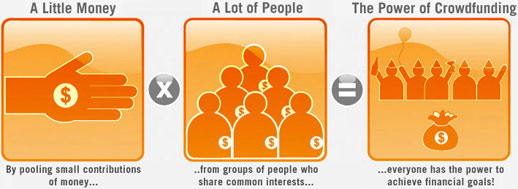Crowdfunding:
A new way of raising capital for your business

It is widely recognised that new
firms face difficulties in attracting external finance in their initial stages,
be it through equity capital, bank loans or bootstrapping. Numerous
entrepreneurial projects stay unfunded, partly because of lack of adequate
value that can be guaranteed to financial investors. To avoid these problems,
founders of creative projects have recently employed a new source of finance,
which involves tapping the crowd, instead of professional investors.
The concept of crowdfunding is
embedded in the wider concept of crowdsourcing, which refers to the act of
tapping into the collective intelligence of the public to complete
business-related tasks that a company would otherwise either perform itself or
outsource to a third-party provider. With crowdfunding, the objective is to gather
money from the public for investment purposes, typically using the internet and
social media. As opposed to raising funds from a small group of sophisticated
investors, crowdfunding assists firms to obtain relatively small amounts of
money from large audiences (the "crowd").
One of the triggers that helped
crowdfunding grow tremendously is the 2008 financial crisis, which made it
difficult for entrepreneurs to access funds from banks and other traditional
sources of lending. This has forced business people and other non-governmental
organisations to shift from established traditional structures to other
functional methods. Crowdfunding is therefore just one of the ways that businesses
have used to raise the funds they need. Since an increasing number of ventures
remain funded, they are willing to try the new pool of investors and funders
that also seek ready markets for their financial products.
According to the available data
by the Small and Medium Enterprises Development Agency of Nigeria (SMEDAN), by
2006, the SME sector in Nigeria contributed about 75% of jobs for the
population that were employed. Despite the major growth of the SME sector, a
major challenge that many entrepreneurs face is financing. This will come as no
surprise to even a casual observer of the Nigerian wide business environment,
but what is interesting is that the size of funding typically sought, and the
purpose intended, both fit well with crowdfunding. In many cases, funds are
sought for innovation and new product or service development. Crowdfunding in
its many forms is well able to provide such funding for a well-managed business
or project, and the crowd-validation element of a crowdfunded business can
bring considerable benefit to the entrepreneurs.
Below are 10 great benefits that
crowdfunding offers an entrepreneur, according to Forbes:
1.
It
provides access to capital
2.
It
hedges risk
3.
It
serves as a marketing tool
4.
It
gives proof of concept
5.
It
allows crowdsourcing of brainstorming
6.
It
introduces prospective loyal customers
7.
It's
easier than traditional application
8.
It's
free PR
9.
It
provides the opportunity of pre-selling
10. It is free!
Crowdfunding is relevant and
would be of benefit to the Nigerian economy as the rigorous process involved
and numerous documentation required to obtain a bank loan makes it difficult
for start-ups who are seeking capital to obtain it. With a lack of alternative
sources of capital and limited supply of secured funds to grant loans, the cost
of lending is extremely high, and is forecasted to continue to rise as monetary
policies tighten – making loans out of reach for many individuals and business
owners. In addition to this, there are simply not enough jobs to accommodate a
vastly youthful population, so people become entrepreneurs by default in order
to make ends meet. What this means for investors is that, there is an immense
opportunity set with which to work. Thus, crowdfunding initiatives will assist
those with businesses or projects by raising the required finances to enable
them carry out essential activities.
From my research, it is apparent
that Nigeria is severely underutilising the opportunity presented by crowdfunding,
if at all. The awareness and understanding of the potential for crowdfunding
needs to be widely embedded in the business community to build the confidence
to turn an interest in crowdfunding into active engagement and interaction,
which is where value is derived. As with many trends in Nigeria, a bandwagon
effect is likely to be experienced.
Profile
Ladi
Belo, last child of Mr & Mrs Lekan Belo currently works at UBS Investment
Bank, New York. His qualifications include BSc Management at The University of
Manchester, MSc International Business at Aston Business School, MSc Innovation
and Entrepreneurship at Warwick University. His interests include disruptive
innovation, real estate and beverages.



IBS Singapore is always there for you to help in raising your business, So if you have any other queries, then visit www.consultibs.sg
ReplyDeleteI am thankful to you for sharing this plethora of useful information. I found this resource utmost beneficial for me. Thanks a lot for hard work. best-tablet-for-reading-and-annotating-pdf
ReplyDelete